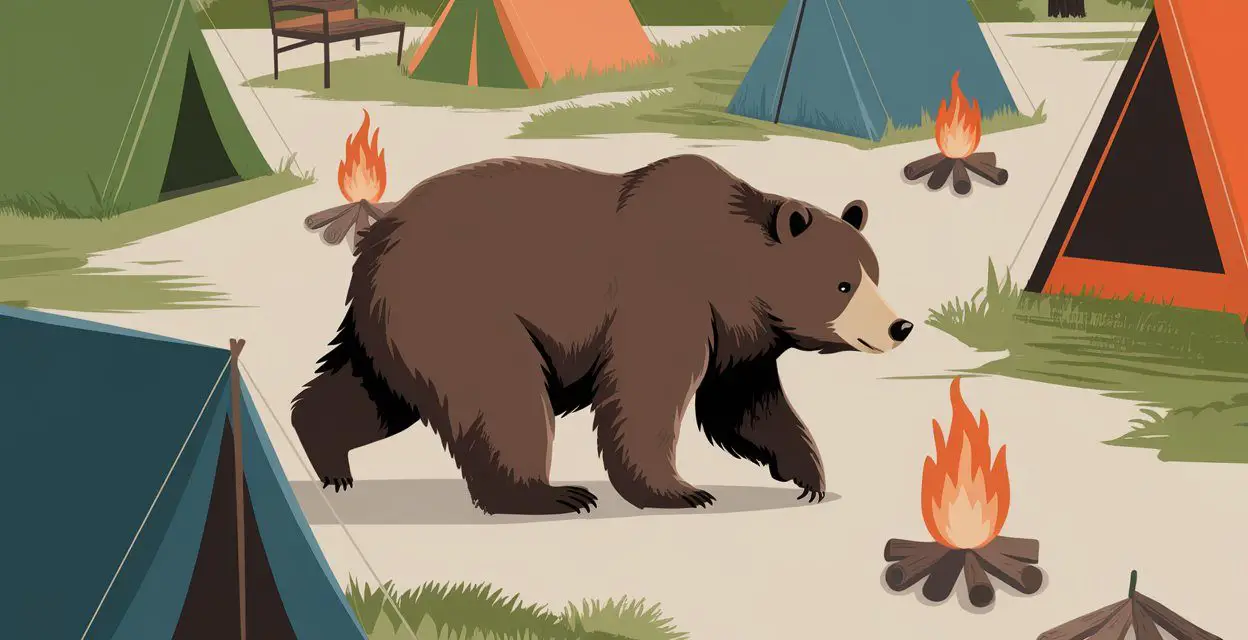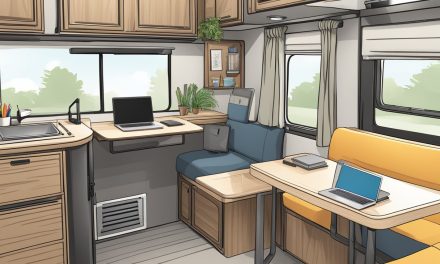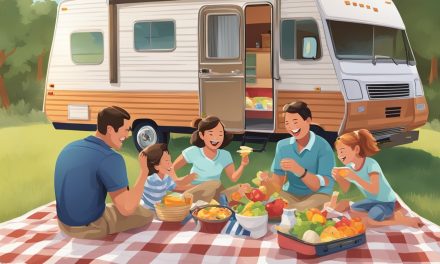You may wonder, can a bear break into an RV while you’re camping near Yellowstone National Park or the Rocky Mountain National Park? Black bears and grizzly bears have strong paws and a keen sense of smell, making campervans like your Winnebago tempting targets.
This blog shares stories from real RV owners, food storage tips, and easy safety steps to keep wild bears out of your travel trailer in bear country. Keep reading to protect both your family and wildlife on your next rv camping trip!
Key Takeaways
- Bears, like black bears and grizzlies, can break into RVs by smashing windows, tearing doors, or ripping through thin walls. This happens in places such as Yellowstone National Park and Jasper, Canada.
- Food smells attract bears from miles away. Leaving snacks out or not sealing trash can invite them to your campsite or RV.
- Some campers report seeing bears damage coolers and eat all the food inside. Rangers in British Columbia point to bear break-ins caused by poor food storage every year.
- Use airtight containers for food and keep trash locked up tight. Close and check all doors and windows before you leave your RV unattended.
- Carry bear spray at all times in bear country. If a bear enters your RV, stay calm, back away slowly, call local wildlife authorities right away, and never fight the bear on your own.
Can a Bear Break Into an RV?
Turns out, a grizzly or black bear can open doors, smash windows, and tear through thin RV walls like a hot knife in butter. If you camp near Yellowstone National Park, Jasper in Canada, or the wilds of British Columbia—always think twice about food storage and locking up tight at night.
Common scenarios of bear break-ins
Bears often sniff out snacks left inside your RV in places like Yellowstone National Park or Jasper, Canada. A loaf of bread on the counter or a bag of chips on the table acts like an invitation to black bears and grizzlies alike.
Sometimes, campers toss food wrappers in outside bins without sealing them tight. In British Columbia and Rocky Mountain National Park, rangers report hungry brown bears tearing off doors or smashing windows just to grab leftovers.
You might hear stories on forums about grizzlies pawing at coolers during whale-watching season near Prince Rupert. Bears remember easy meals; so if someone fed one last year by accident around sporting camps, it may come searching again this summer.
Food storage mistakes can bring bear encounters faster than you can say “bear-proof container.” Few incidents happen each year among millions of RV owners, but a single human-bear interaction gone wrong can quickly turn into a serious problem.
Examples of damage caused by bears
Bears can create a lot of damage when they break into an RV. They often seek out food, which leads to destruction.
- Torn doors and windows can happen as bears try to get inside your RV. They are strong and determined creatures.
- Coolers can get smashed open if not secured properly. Bears recognize them as a food source.
- Cabinets may be ripped apart while searching for snacks. This can leave your belongings scattered everywhere.
- Furniture can get damaged when bears move around in the small space of an RV.
- Food items can be completely consumed or ruined during an encounter, wasting valuable supplies.
- The exterior of your RV might show scratches and dents from bear claws, making it look rougher than before.
Protecting your RV from these events is crucial while camping in bear country, like Yellowstone National Park or Rocky Mountain National Park.
Why Do Bears Target RVs?
Bears often target RVs because of food smells. When you cook or store food, the scent can travel a long way. Bears have a strong sense of smell, so they easily catch whiffs of tasty snacks.
They are curious creatures and will investigate anything that looks or smells like a meal. If your RV is open or has weak locks, bears see it as an easy chance for a feast.
Attraction to food and scents
Bears are attracted to food and strong scents. They have an amazing sense of smell, much better than humans or even bloodhounds. Odorous foods like tuna, sausage, and bacon can draw them in from far away.
If you leave food out or dispose of garbage carelessly, bears will notice it right away.
Many campers don’t think twice about what they throw in the trash. Improper waste disposal easily attracts bears. Even citronella products can lure them due to their scent. In bear country, be careful with what you store outside your RV.
Keep everything sealed up tight to avoid unwanted visitors!
Bear behavior and instincts around campsites
Bears have a strong sense of smell. They can detect food from miles away. This instinct often leads them to campsites and RVs, where humans store snacks and meals. While black bears might seem friendly, they can become dangerous if they feel threatened or want food.
A bear can run as fast as 30 miles per hour and climb trees easily, including grizzlies.
At night, bears are especially active. They wander around looking for meals. Lack of wild food might push them into areas filled with people like national parks or campgrounds. You must be cautious in bear country; their natural instincts drive them toward human food sources and garbage bins left out in the open.
Keeping your campsite clean is key to avoiding unwanted visitors!
Prevention Tips to Protect Your RV from Bears
Bears love to snoop around RVs. You can keep them away with a few smart moves.
Store your food in bear-proof containers. Keep trash sealed and locked up tight. Make sure all doors and windows close securely, too. Use bear spray or alarms if you’re camping in bear country.
It’s like an extra layer of protection you don’t want to skip!
Proper food storage and waste disposal
Store food in airtight containers. These keep smells inside and bears outside. Lock food in the trunk of your vehicle, especially when you leave your RV. Bears have a strong sense of smell, so even small spills can attract them.
Would you like to save this article?
Dispose of trash properly to avoid bear visits. Use bear-proof trash containers when possible. If those are full, double bag your garbage and lock it in your car. Never bury or burn trash; this won’t keep bears away and could lead to trouble.
Following these tips helps keep you safe during RV camping trips in bear country like Yellowstone National Park or Rocky Mountain National Park.
Securing doors and windows
Close your windows and lock your doors before you leave. This simple step can save you a lot of trouble. Bears are curious creatures. They may sniff around your RV if they smell food or scents from inside.
A locked door keeps them out.
Check the locks on all doors and windows, too. Make sure they work well and don’t stick. You want to be sure that nothing gets in while you sleep or when you’re away from camp. Some people even add extra security like bear-proof containers for their food storage outside the RV, which helps reduce those tempting smells nearby.
Locking everything up makes it harder for black bears or grizzly bears to find their way inside your home on wheels!
Using bear deterrents such as sprays or alarms
Bear spray is a key tool for staying safe in bear country. It’s not just any deterrent; it’s often more effective than guns during bear encounters. Keep your bear spray within reach, especially at night.
If a bear approaches your RV, use the spray to keep it away.
Noise can also help scare bears off. Carry an air horn or another loud device. A sudden noise might startle a curious bear and send it running back into the woods. Being prepared with these tools can make your camping experience safer and more enjoyable!
What to Do If a Bear Breaks Into Your RV
If a bear gets into your RV, don’t panic. Stay calm and back away slowly to a safe spot. Don’t approach the bear or try to scare it off. Use your phone to call local wildlife authorities for help.
They know how to handle these situations safely. Make sure you report what happened so they can help keep others safe too. Keep your bear spray handy, but only use it if absolutely necessary!
Safety measures to follow during an encounter
Stay calm if you see a bear. Panic can make things worse. Follow these steps to stay safe.
- Yell loudly to scare the bear away. Make your voice strong, as if you are trying to get attention from a friend far away.
- Look big and tall. Stand on something or raise your arms above your head to appear larger.
- Make noise using rocks, pots, pans, or your car horn. This can deter the bear and let it know you’re there.
- Avoid cornering the bear when it’s close by. Always give it an escape route so it doesn’t feel trapped.
- Back away slowly without turning your back on the bear. Keep your eyes on it while moving away.
- If attacked, fight back aggressively with anything you have handy, like a backpack or a stick.
Stay alert in bear country! Bear safety is crucial while RV camping in places like Yellowstone National Park or Rocky Mountain National Park. Your actions can really matter during a tense situation, especially during human-bear interactions!
Steps to report and handle the situation
If a bear breaks into your RV, staying calm is key. You need to act fast to keep yourself and others safe.
- Close all doors and windows immediately. This helps keep the bear inside your RV from escaping and potentially causing more chaos outside.
- Move away from the RV slowly and quietly. Loud noises may scare the bear, making it act unpredictably.
- Call 911 right away if you’re in Colorado or contact local authorities for help. They can send professionals who are trained to handle bear situations.
- If you’re at a national park, notify park rangers as soon as possible. They keep track of bear activity in the area.
- Take pictures of any damage caused by the bear; these can be helpful later for insurance claims or reporting purposes.
- Stay where it’s safe until help arrives. Do not try to confront or scare off the bear by yourself; this can lead to dangerous encounters.
- Once the situation is under control, follow up with Colorado Parks & Wildlife offices during business hours for further guidance on safety measures going forward.
Bears are attracted to food and scents, so keeping everything secure is vital for your next adventure in bear country!
Conclusion
Bears can break into your RV, and it happens more than you think. They smell food and are curious creatures. Keeping your camp clean is key. Use bear-proof containers for food and lock all doors securely.
Carrying bear spray adds an extra layer of safety in bear country, like Yellowstone or Rocky Mountain National Park. Stay smart, stay safe, and keep bears at bay!
FAQs
1. Can a black bear or grizzly break into an RV while camping in national parks?
Yes, both black bears and grizzlies have broken into campers’ vehicles, including RVs. They use their strength and sharp claws to pry open doors or windows if something smells like food inside.
2. What makes my motorhome attractive to bears in places like Yellowstone National Park or Rocky Mountain National Park?
Food storage is the big draw for bears. Even a tiny crumb can trigger their search instincts. Bears often roam campgrounds in bear country looking for easy snacks left behind by people.
3. Are bear-proof containers necessary inside an RV during tent camping trips near bear habitats?
Absolutely, using bear-proof containers helps keep your meals safe from curious noses. It’s not just for tents; even when you’re sleeping on four wheels, proper food storage lowers the risk of human-bear interaction.
4. How do I protect myself from a possible bear attack while RV camping with Thor Industries rigs around grizzlys?
Keep all food sealed away and never leave it out at night. Bear spray should be within reach at all times—think of it as insurance you hope never to need but are glad you packed.
5. If I see signs of a recent bear attack nearby, what steps help prevent another incident during my stay?
Report any sightings right away so rangers can respond quickly—that’s standard practice across national parks where attacks happen sometimes. Keep your campsite clean, store everything with scent tightly closed up, and always follow park rules about wildlife safety measures to reduce risks for everyone around you—including those furry neighbors who’d rather sniff than scuffle!







